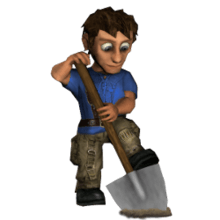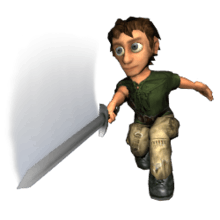OpenClonk
| OpenClonk | |
|---|---|
|
OpenClonk Logo | |
| Developer(s) | OpenClonk Developers |
| Designer(s) | OpenClonk Developers |
| Engine | Custom (C++) |
| Platform(s) | Microsoft Windows, Linux, OS X |
| Release date(s) |
16 January 2016 (OpenClonk 7.0) |
| Genre(s) | Action |
| Mode(s) | Single-player, Multiplayer |
OpenClonk is a free and open-source 2D action game in which the player controls clonks, small but witty and nimble humanoid beings. It is mainly about mining, settling and fast-paced melees and features tactical gameplay elements. The game can be played both single-player and multiplayer and is cross-platform, playable on Microsoft Windows, Linux, and OS X.
The OpenClonk project is dedicated to a continuous development of the Clonk game series and new features are released regularly. OpenClonk denotes not just the game, but also the 2D game engine it is based on, which allows the creation of mods using a specially designed scripting language. The source is available under the ISC license[1][2] and game content is licensed under CC-BY.
Gameplay
The gameplay features elements of action as well as tactical games. The player controls clonks, small but witty and nimble humanoid beings using the keyboard and mouse. Clonks are the main characters in the game and can perform various tasks ranging from shoveling through earth, throwing dynamite to mine gold, use a hammer to construct a building to flying around with airships, riding on rockets and wielding swords. The OpenClonk game world consists of a dynamical and destructible pixel landscape and out of objects living and interacting with that landscape. The landscape is constructed out of different materials like earth, tunnel, sky, coal, ore, gold and water. Players can destroy these materials by digging or explosions for solid materials and by using gravity or pumps for liquids. The various in-game objects and tools available to the clonk allow for a dynamical gameplay.
Gameplay is focused around two elements: In settlement rounds the players need to cooperate and build up large settlements to perform certain tasks like mining gold or constructing a legendary statue, and in melee rounds players battle each other in small arenas. Other types of gameplay include parkour rounds where players have to pass checkpoints in challenging landscapes as fast as possible.
Settlement

Settlement rounds can be played cooperative, where two or more players work towards a mutual goal. In these type of rounds players have to build up settlements using the resources in the landscape, ranging from wood and metal to fire stones. These settlements and their production lines allow the player to construct advanced items and vehicles like grapple bows or airships. With the more advanced items players can fulfill complex tasks and finally the goal of the round. Typical challenges in settlement rounds are provided by inhospitable landscapes, natural disasters like meteors and volcanoes and transporting large objects. Among goals for settlement scenarios one finds:
- Wealth: gain a certain amount of gold (called clunkers in Clonk).
- Expansion: expand your settlement to some area of the landscape.
- Mining: mine a certain amount of valuables like gold or gems.
- Construct Statue: gather statue parts and construct a statue.
Melee

Melee rounds may have different goals, however, they all share the fact that opponents must be eliminated. In OpenClonk melee rounds are usually rather short with a typical length between 5 and 30 minutes. The players control a single clonk and have to attack enemies using the various weapons available in the game, like swords, bows, dynamite, grenade launchers, muskets and catapults. Among the different types of melees are:
- Last Man Standing: players have a certain amount of relaunches and need to survive as long as possible.
- Deathmatch: players have to achieve a certain amount of kills.
- Capture the Flag: Capture enemy flags and bring them to your base to gain points.
- King of the Hill: Try to defend a certain region as long as possible to stay king.
Development
OpenClonk development began with the release of the source of Clonk Rage in February 2009[3] and a later release under the ISC license in May 2009.[1][2] The website www.openclonk.org was founded at the same time, acting as a portal for both development and for players. The source code and game content were hosted first using a Mercurial repository, but nowadays using a Git repository.
The game engine is programmed in C++ and is cross-platform. The game is released for and runs on Windows, Linux and Mac OS X, it also may be compiled for FreeBSD. Game content is created using the game's own scripting language C4Script,[4] and is developed simultaneously with the game engine. Since the game content and engine are completely separate, mods and completely new game content can be created based on the OpenClonk engine.
Development of OpenClonk is completely open and contributions from the community are often accepted as patches.
Releases
OpenClonk is being released on a regular basis with roughly a major release every year. Major releases are published when the engine or the game content has received large modifications or important features have been added. Minor releases are done for bug fixes and small updates to the game content. The current stable version is OpenClonk 4.1 released on 16 February 2014.[5]
- OpenClonk 1.0 (3 December 2010)[6]
- OpenClonk 2.0 (1 October 2011)[9]
- OpenClonk 3.0 (14 October 2012)[12]
- OpenClonk 4.0 (26 January 2014)[16]
- OpenClonk 4.1 (16 February 2014)[17]
- OpenClonk 5.0 (5 October 2014)
- OpenClonk 6.0 (15 March 2015)
- OpenClonk 6.1 (12 June 2015)
- OpenClonk 7.0 (16 January 2016)[18]
Reception
In a popularity competition organized by the Linux Game Awards OpenClonk received a third place in the Project of the Month: March 2014.[19] Furthermore, on Desura OpenClonk currently (June 2014) has a 9/10 user rating.[20] German computer magazine c't has added OpenClonk to a DVD shipped with their magazine in April 2011.[21]
See also
References
- 1 2 "Clonk Rage Source ISC". clonk.de. 2009-05-23.
- 1 2 OpenClonk git repository: COPYING
- ↑ "Clonk Rage Source Released". clonk.de. 2009-02-22.
- ↑ "C4Script Documentation". openclonk.org. 2014-06-28.
- ↑ "OpenClonk 4.1 Release". openclonk.org. 2014-02-16.
- ↑ "OpenClonk 1.0 Release". openclonk.org. 2010-12-03.
- ↑ "OpenClonk 1.1 Release". openclonk.org. 2010-12-28.
- ↑ "OpenClonk 1.2 Release". openclonk.org. 2011-02-12.
- ↑ "OpenClonk 2.0 Release". openclonk.org. 2011-10-01.
- ↑ "OpenClonk 2.1 Release". openclonk.org. 2011-10-10.
- ↑ "OpenClonk 2.2 Release". openclonk.org. 2012-02-10.
- ↑ "OpenClonk 3.0 Release". openclonk.org. 2012-10-14.
- ↑ "OpenClonk 3.1 Release". openclonk.org. 2012-10-15.
- ↑ "OpenClonk 3.2 Release". openclonk.org. 2012-11-18.
- ↑ "OpenClonk 3.3 Release". openclonk.org. 2013-03-10.
- ↑ "OpenClonk 4.0 Release". openclonk.org. 2014-01-26.
- ↑ "OpenClonk 4.1 Release". openclonk.org. 2014-02-16.
- ↑ "OpenClonk 7 released". openclonk.org. 2016-01-15.
- ↑ "Project of the Month: March 2014". Linux Game Awards. 2014-02-26.
- ↑ "OpenClonk on Desura". Desura. 2014-06-29.
- ↑ "OpenClonk on c't DVD" (PDF). heise.de. 2014-06-29.